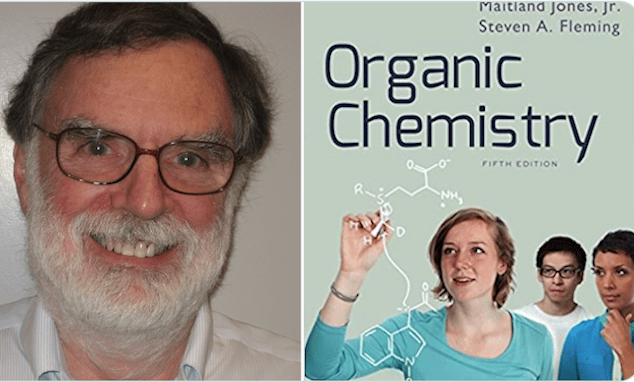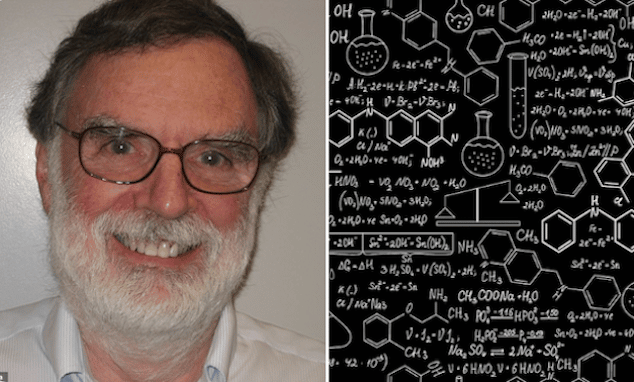

Maitland Jones Jr. NYU chemistry professor fired after students sign petition saying class was too hard. Lowering the education bar or maintaining high benchmarks in the face of student ‘buyer’ expectations?
A New York University professor has been fired after a group of students signed a petition claiming his course (a pre-cursor for medical school) was too difficult.
Maitland Jones Jr., 84, had 82 of his 350 organic chemistry students sign the petition citing Jones’ teaching methods and course outline as reasons for their poor grades.
‘We are very concerned about our scores, and find that they are not an accurate reflection of the time and effort put into this class,’ the petition said, according to a New York Times report.
‘We urge you to realize that a class with such a high percentage of withdrawals and low grades has failed to make students’ learning and well-being a priority and reflects poorly on the chemistry department as well as the institution as a whole.’
Accusations against the educator include: reducing the number of midterm exams from three to two; no offering of extra credit; no Zoom access to lectures for those with COVID-19; along with accusations that Jones taught with a ‘condescending and demanding’ tone.
(1/n) At N.Y.U., Students Were Failing Organic Chemistry. Who Was to Blame? Maitland Jones Jr., a respected professor, defended his standards. But students started a petition, and the university dismissed him.https://t.co/iMkC7Xm8SJ
— Roland Baker (@RolandBakerIII) October 3, 2022
Students failing – who is to blame?
Jones defended accusations made via the petition, adding that he reduced the number of exams because NYU scheduled his first test after six classes.
Technology in the lecture hall in which Jones taught prohibited him from recording his writing on the white board.
He said the problem with students emerged a decade ago, just a couple years after he moved from Princeton to NYU in 2007, as he noticed a loss of focus in his students.
As students returned from virtual learning as a result of the pandemic, that problem only got worse. Students were not studying and, Jones said, students seemingly did not know how to.
‘We now see single digit scores and even zeros,’ he said.
In an effort to help students, Jones and two other professors taped 52 lectures, which Jones says he paid $5,000 of his own money to publish. They are still used.
In 2020, an estimated 30 students out of 475 signed a petition saying they need more help.
Was class really that much harder?
‘They were really struggling,’ Jones said. ‘They didn’t have good internet coverage at home. All sorts of things.’
Jones was not alone in the pushback from students in the return from pandemic learning.
Kent Kirshenbaum, another organic chemistry professor, discovered students cheating during online tests. Citing poor conduct in his decision to reduce grades, students protested by saying ‘they were not given grades that would allow them to get into medical school.’
Entering 2022, Jones said students were increasingly disengaged.
‘They weren’t coming to class, that’s for sure, because I can count the house,’ Jones said. ‘They weren’t watching the videos, and they weren’t able to answer the questions.’
Following the course’s second midterm – a test which resulted in an average score of 30 – several students began to panic about the course as it was a prerequisite for applying to medical schools.
Maitland Jones Jr. was an endowed chair at Princeton for more than 20 years until he took retirement and came to teach at NYU. The University tried to accomodate complaining students, including unprecedented reviews of grades. These students and their parents threw a tantrum. https://t.co/rltfio27wF
— Joshua Stein, philosophy, ethics, politics (@thephilosotroll) October 3, 2022
The business of education and students as customers
Former student Ryan Xue, who transferred to Brown after completing the class, said he liked both Jones as a professor and the course.
‘This is a big lecture course, and it also has the reputation of being a weed-out class,’ Xue said.
‘So there are people who will not get the best grades. Some of the comments might have been very heavily influenced by what grade students have gotten.’
Other students who most recently took the course told The New York Times that Jones was helpful when they asked for help, but he could be sarcastic.
Zacharia Benslimane, a Ph.D student at Harvard and former teaching assistant for Jones, emailed NYU in his defense.
‘I think this petition was written more out of unhappiness with exam scores than an actual feeling of being treated unfairly,’ he wrote. ‘I have noticed that many of the students who consistently complained about the class did not use the resources we afforded to them.’
Jones said he fears for other professors at the university who may face the same response from faculty.
‘I don’t want my job back,’ he said. ‘I just want to make sure this doesn’t happen to anyone else.’
And then there were the following comments on social media below that made this author wonder. See what you think?
NYU chemistry professor fired: social media responds
This is the new academic. Lower the bar for those that have low IQ’s. Airline pilots, Medical field, Law enforcement, Teachers.
The decadence of Western Civilization: Lower standards! Lower expectations! Do not demand excellence! We can turn this around. The question is this: Will we?
And these are our future doctors. Anyone want a doctor or surgeon who wasn’t even smart enough or dedicated enough to pass a pre-med class???? One who is passed just because of emotional fragility & not for merit? Anyone????
Organic chemistry is a weed-out class. I can guarantee all these students who got poor grades will get poor grades again when they retake this class with a different professor, unless they study really hard.





